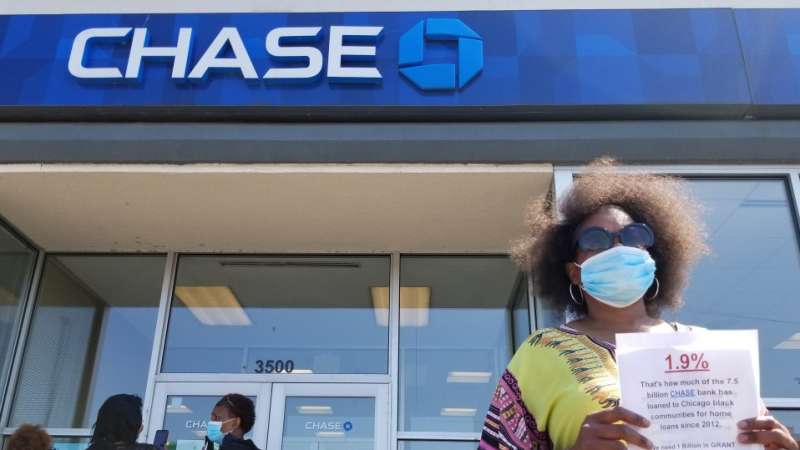Chase lends to fossil fuels companies — but not Black communities

This is a guest blog by Jamie Henn, reposted with permission from Stop the Money Pipeline.
Protests are underway at Chase bank branches in the city of Chicago, where a recent report showed that of the $7.5 billion in home purchase loans Chase has provided since 2012, only 1.9% has gone to Black neighborhoods.
“If your dollar goes into (Chase) Bank … you are funding your oppression,” said activist Ja’Mal Green, who helped organize the protests. “This banking institution — who won’t lend to you — is a co-conspirator in all the stuff we’re fighting about.
“Imagine if we were able to get loans,” Green told protestors at a Chase branch. “Imagine if we were able to build up these communities. Then these kids would have jobs…The police won’t be messing with them, because we got an economy of our own, and we got money circulating in our community.”
Stop the Money Pipeline fully supports these efforts to turn up the heat on Chase and demand reparations for the Black community. As we wrote in the statement we released after the murder of George Floyd, “Our financial system is built on the legacy of exploitation, colonialism, slavery, and white supremacy. Financial institutions create and maintain racial inequality through policies like red-lining, and predatory and discriminatory lending practices.”
Since 2016, Chase has been able to find nearly $269 billion to finance fossil fuels companies, while denying Black communities and other communities of color the loans and financing they need for housing, economic development, and all the related opportunities that come with it.
Not only that, the fossil fuel projects that Chase does fund, disproportionately harm Black communities. As Rev. Lennox Yearwood of the Hip Hop Caucus said at the first Stop the Money Pipeline protest at a Chase Bank branch in Washington, D.C. last January, “We’re also here because the pipelines you are building are in the communities of Black and Brown people and, so, that can’t be the situation. You’re funding pipeline projects that are literally causing asthma or bronchitis or worse, cancer. We can’t support that. The folks who are impacted by this are people who look like me, who are Black and Brown people who are suffering. I just want to keep it 100% real: that the money that comes out of this bank literally kills poor people in the same community they’re operating in. There’s too many reasons to stop this madness.”
Our goal as a movement needs to be not only to divest from destruction, but to invest in justice. That means getting resources to the communities — most often communities of color — who have been discriminated against for over a century. Communities who are forced to bear the brunt of pollution and the climate emergency. As Tamara Toles O’Laughlin of 350.org wrote recently in Grist, “Divestment from fossil fuels is seen as a smart response to climate risk. It’s about building a world of solutions, with investments in community care and repair such as green jobs and infrastructure, human health-centered resources, and recovery for those most impacted by the climate crisis.”
Tamara asks all of us in her piece, “The future of our planet demands that we recognize inequity and defend our communities against compound injustice. In this moment of grief, we are reminded that the system is not broken, but rather operating as designed — which begs the questions: Are you willing to hold accountable all of the systems built off white supremacy — from the fossil fuel industry to racist policing to the prison industrial complex — in defense of the planet? Are you willing to interrogate your complicity in the systems built on white supremacy and commit to dismantling it?”
Those are questions that we all should be asking ourselves these days. More than that, we should be joining those in the streets who are taking action, whether it’s protesting at a Chase Bank branch in Chicago or marching through the streets of Washington, D.C. Stop the Money Pipeline has been emailing our supporters and doing everything we can to turn people out for Juneteenth and the demonstrations this weekend. Check out the Movement for Black Lives website for more information about how you can get involved.
We look forward to lending our support however we can to the movement in Chicago — and all across the country — to demand that banks like Chase start investing more in Black communities and provide reparations for the damage they’ve done. And we have an idea where that money could come from: ending all the loans they’re currently giving to dirty fossil fuel projects.
